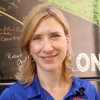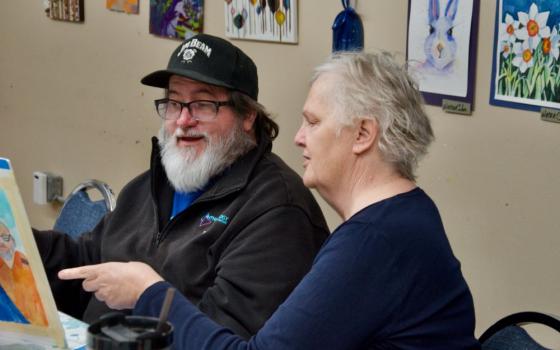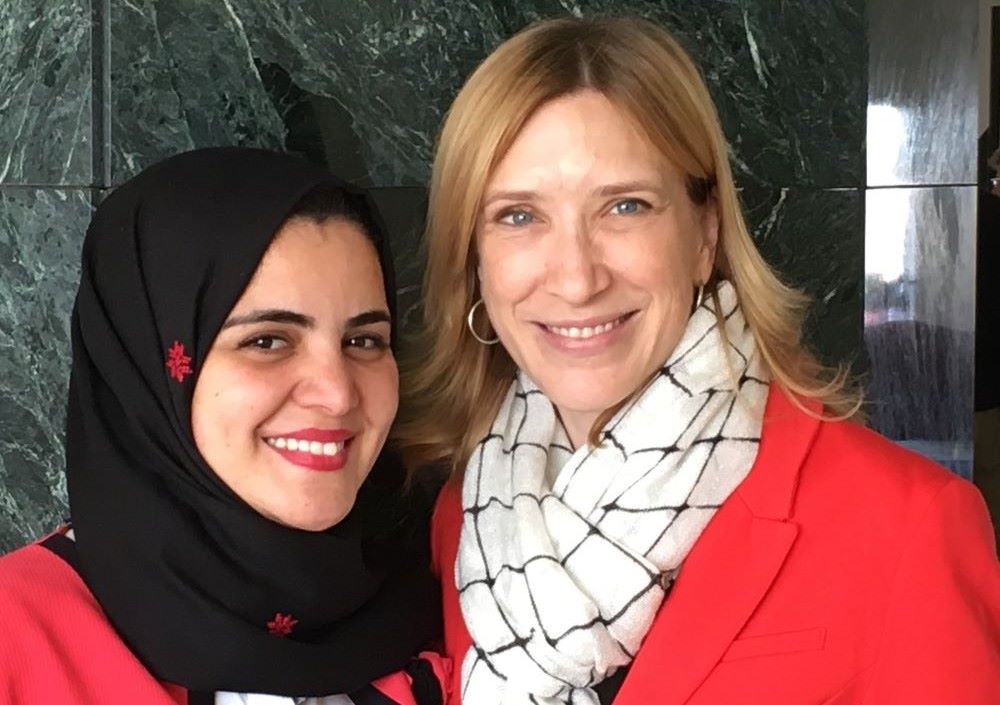
Asrar Jaber, left, and Dominican Sr. Quincy Howard celebrated Christmas at the Mound, the motherhouse of the Dominican Sisters of Sinsinawa, Wisconsin, in 2018. The sisters' relationship with Jaber "helps them tangibly connect to the reality of the situation in Gaza." (Courtesy of Quincy Howard)
Asrar moved into my community in Washington, D.C., for an internship in 2018. She was just learning English when she joined our Catholic intentional community of a dozen diverse Americans. She had been living and studying in the States for a year. The first time she volunteered to cook for us, I thought, "The poor thing doesn't know what she's in for!"
A few things about Asrar quickly became apparent: She was wise beyond her 28 years. Even with limited English, she could read people well. She had an adventurous spirit. She asked hard-hitting questions that pushed me (and others) to be honest and authentic. And she casually cooked up delicious, exotic meals for large groups of people with ease! Back home in Gaza, Asrar's mother had taught her to cook to help with their family of 13.
We became fast friends as her stay stretched into eight months. Driving lessons and learning to ride a bike are great bonding experiences. We talked about our personal experiences of Catholicism and Islam, sharing how we engaged with our respective faith traditions and where we struggled. She peppered me with questions about what I believed and why. At that time, Asrar was questioning her faith — doubts had emerged after a lifetime of watching the hardship experienced by her people in Gaza. The depth of her faith was evident, however, in the way she lit up when our community observed daily iftar during Ramadan and celebrated Eid al-Fitr with her.
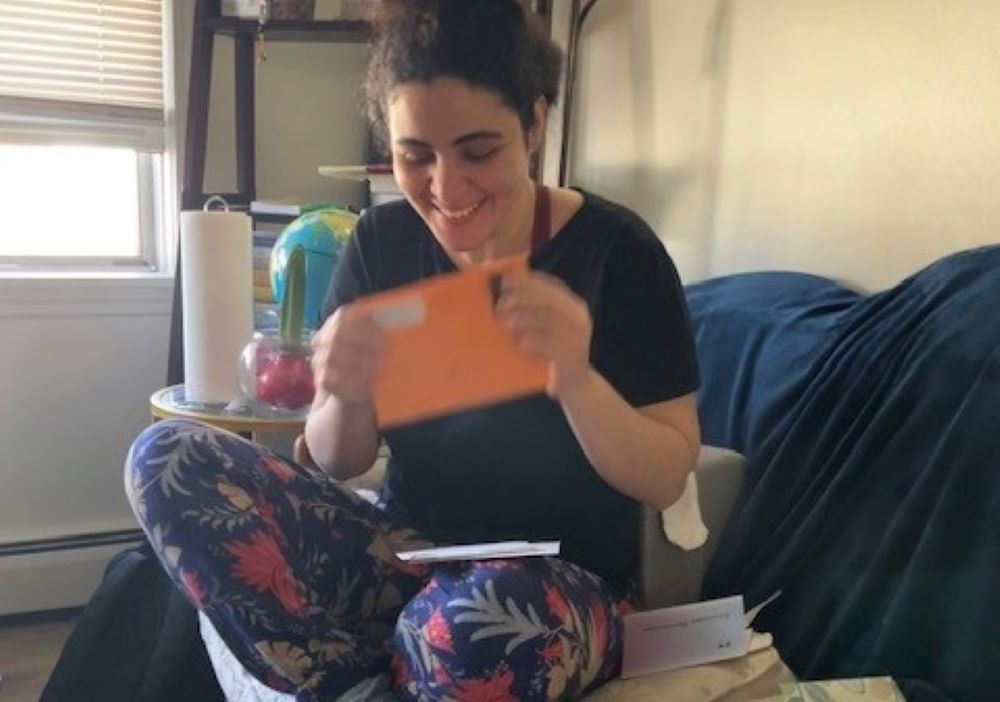
Asrar Jaber opens letters from sisters on her birthday. (Courtesy of Quincy Howard)
With the end of her internship, her immigration status got shakier. She would need to leave and return to the U.S. in order to continue her studies. Asrar had secured a full scholarship for graduate studies in philanthropy in Indiana, but only if she could make it back into the U.S., and that felt like a long shot. Before she left, I invited her to my motherhouse for the holidays after which I would drive her to school in Indianapolis. Given what I understood about our immigration system, the nature of her visa and restrictions on Palestinians' travel, those plans seemed like a dim prospect. When she left, I suspected I would not see her again for a very long time, if at all.
Asrar returned two days before I left for my Christmas visit and she was excited to come with me to the Sinsinawa motherhouse in Wisconsin. "The Mound," as it's known, hosted the most beautiful Christmas celebrations and it would be her first time experiencing Christmas. She was so excited to meet the sisters and — when she learned that the Sinsinawa Dominicans are seasoned teachers — about practicing her English.
Asrar had an immersion experience at Sinsinawa Mound and she fit right in! Each day we met to debrief about the conversations she'd had with this or that sister and she would grill me about words or context for those exchanges. On Christmas Eve the congregation put on a multicultural talent show. Asrar taught me to dance the dabke and we performed it for the sisters. She came to Mass and often joined us at morning or evening prayer. When it was time to go, the sisters lined up and sang the Dominican blessing for her next chapter at school. Witnessing her experience Christmas at the Mound was deeply significant for all of us.
During her studies, I got to check in periodically, stopping by when I drove between D.C. and the Sinsinawa Mound. It was during that time that she fell in love and was engaged to marry Ramen, a Saudi student. Upon finishing her degree, they moved to Chicago, where she enrolled in a graduate program in nonprofit development. She would need to continue her studies to remain in the U.S. and had received another full scholarship. Everything in Asrar and Ramen's lives revolved around meeting immigration restrictions and requirements or waiting in limbo to find out what they could do. This included where or when they would be able to marry. And travel restrictions in the U.S. and in Gaza precluded a wedding with family, which is what Asrar longed for.
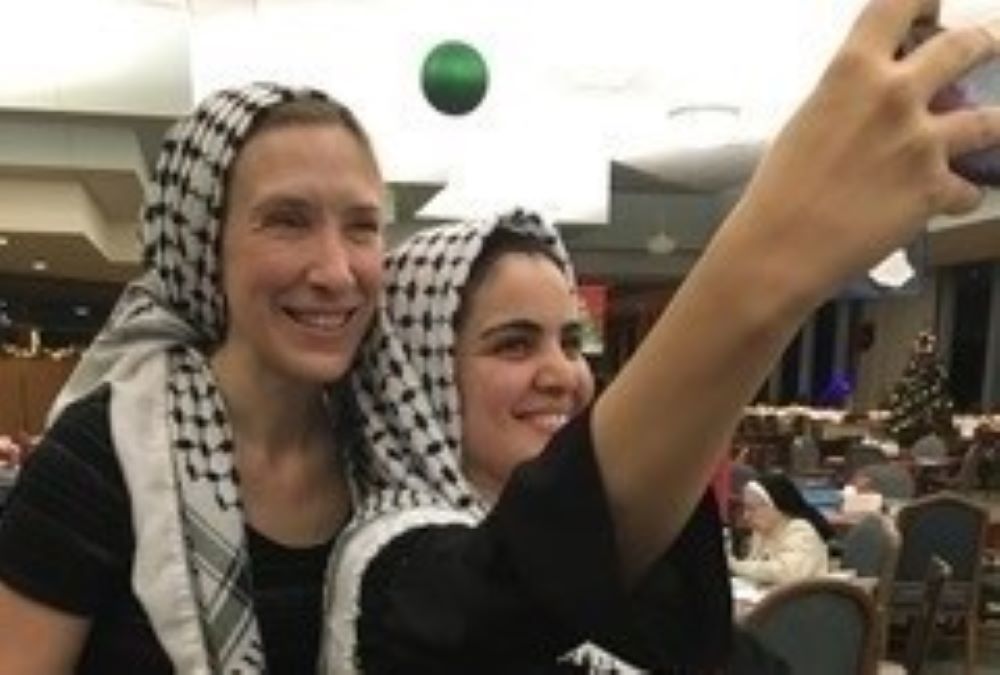
Asrar Jaber takes a selfie with Sr. Quincy Howard after they performed the dabke, a dance, at a holiday event at the Dominicans' Sinsinawa motherhouse. (Courtesy of Quincy Howard)
Around this time, my congregation was planning for the sisters to move to a new retirement facility across the state. When she learned that the sisters were leaving the Mound, Asrar was determined to have Ramen experience the place first. About a month before the sisters left, Ramen arrived to meet them and he watched, wide-eyed and smiling, as they greeted Asrar like an old friend. At evening prayer, I told the sisters about the challenges of their engagement and asked for a blessing on their partnership. A tearful Asrar and a shocked Ramen stood before them and received their blessing.
Soon after, Asrar applied for a visa waiver that would provide a more predictable status with more freedom to travel. I edited her essays about life in Gaza, and they were eye-opening. In some ways, Asrar experienced a joyful childhood surrounded by a warm and caring family, living in a home she loved deeply. At the same time, her whole life she had navigated literal and figurative landmines. She shared memories of the family gathering in her parents' bedroom during missile attacks to ensure that they would die together.
She filed her visa application in January 2023.
On Oct. 7, Ramen was back in Saudi Arabia applying for a marriage certificate — he is still waiting for it. In the meantime, Asrar has watched Gaza get flattened as her family members scramble to survive. In the winter of 2023 her father, who is on dialysis, came close to dying on the harrowing journey to reach Egypt for treatment. Her mother and youngest sister, who is eight months pregnant, remain in northern Gaza in the throes of starvation. The rest of her large family is scattered across the globe, with siblings and cousins waiting in southern Gaza, outside Rafah. They are helpless, terrified and starving. It is horrendous.
Asrar pleaded with her lawyer and with U.S. Sen. Dick Durbin's staff to help move her application. She wanted to travel to Egypt to meet her father and any other family member able to get out of Gaza. For five months, Asrar's application has been in "expedited" status with the U.S. Citizenship and Immigration Services. Thank God, her father made it out of Gaza and remains in a hospital in Egypt.
Racked by guilt and worry, Asrar spent the first months of Israel's attacks on Gaza watching news and scrolling social media for reports about home. She was isolating herself and only responded to texts. At first, I updated the sisters about her family's welfare and requested prayers specific to the most immediate needs: prayers for her father, no longer able to walk, to reach the border. Prayers that his medical records would get him across to a hospital. Prayers for enough nourishment to reach her pregnant sister and mother. Prayers to survive the night during the most violent attacks. Then I would share the sisters' outpourings of love and concern with Asrar. It helped her to see that people did, in fact, care.
Slowly she began allowing calls and, when I was finally able to visit her, all I could do was mirror the feeling of helpless horror. I gently prodded to see how else we might help and she asked for a tutor to improve her English. She wanted to feel confident enough to advocate for her family and her people and to respond to hateful attacks and misinformation. She and Sr. Marie have been meeting twice a week since the new year, giving Asrar a positive focus.
Advertisement
Asrar has, in turn, provided the sisters with a precious gift. Knowing Asrar helps them tangibly connect to the reality of the situation in Gaza. The GoFundMe campaign to rebuild her parents' home in Jabalya has been a beacon of hope for them. Despite the devastation in the Gaza strip, her page offers a glimpse into the joy of her family gatherings and her father's beautifully tended and beloved garden. She maintains hope to begin anew in their home.
When I visit, we have real and intense conversations about what is happening and why. We do not shy away from the complexity and insanity of what is unfolding in the Middle East. Ironically, in discussing these ugly truths together we bolster one another. We pray together — with different approaches to praise and petition the same God — and trust that our prayers echo each other and that they are powerful. I got to be with her for her birthday, but only if I promised that we would not celebrate. My last visit was to observe the end of Ramadan during the solar eclipse. While I would not say it to Asrar, each visit feels to me like a celebration.
My Muslim sister gives me a glimpse into a path to peace. There is a way to sit with the pain while praying for love and healing to displace hatred and violence. There is a way to separate our Jewish and Palestinian sisters and brothers from Hamas and the actions of the Israeli government. I pray for a cease-fire in Gaza and the release of the Israeli hostages. Most of all, I pray for world leaders with imagination.
